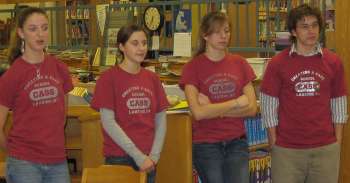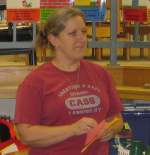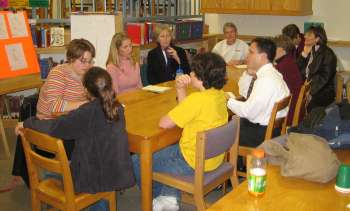- By Dan Veaner
- Around Town
 Print
Print
Monday night a team of student mentors came to demonstrate a CASS program to the Middle School Shared Decision Making Team. CASS stands for "Creating A Safe School" and is a volunteer effort that includes school employees, parents and students. High Schoolers volunteer to be mentors and then present skits and programs and work with Middle Schoolers to get them to think about group dynamics, and being more inclusive, respectful and nicer to each other.

High School Mentors Creating a Safe School
CASS programs stem from the Ophelia Project, an Erie, PA based non-profit organization formed to increase community and parental support for adolescents and to create a safe social culture. "We implement it as it will work for our school and community," explains Gina Lord, a parent who is on the Lansing CASS Committee. Elements that came from the Ophelia project are "the concept of training the High School mentors, going into the Middle School, doing the presentations, and the actual presentations themselves," she says.
Middle School Guidence Counselor Margaret Marcoux and High School Psychologist Pennie Berisi lead Lansing's CASS Task force of around 15 "brainstormers and worker bees" that include Middle and High School Principals, faculty and parents. 50 High School student mentors participate in the program, providing two 90 and nine 40 minute programs to Middle Schoolers throughout the school year. The purpose of Monday's presentation was to give the Shared Decision Making team a taste of what the programs are like.
 A team of four students, Thomas Zarate, Colleen Trowbridge, Lindsay Eisenhut and Kelly Cheatham, started with a skit in which two girls are planning a party. A third girl is told about the party but one of the other girls seeks to exclude her, while a boy in the group just goes along. Facilitator and Middle School math teacher Deb Schwartz stopped the skit and asked the audience to identify what was happening in the group dynamic, and to be specific about their behavior.
A team of four students, Thomas Zarate, Colleen Trowbridge, Lindsay Eisenhut and Kelly Cheatham, started with a skit in which two girls are planning a party. A third girl is told about the party but one of the other girls seeks to exclude her, while a boy in the group just goes along. Facilitator and Middle School math teacher Deb Schwartz stopped the skit and asked the audience to identify what was happening in the group dynamic, and to be specific about their behavior.
The skit was repeated, but this time with the "bystander" characters sticking up for the excluded girl. Again Schwartz led a discussion of what had changed. Then each student mentor led a group in defining the bully's behavior and what that person was likely to be feeling inside. While it was effective with the largely adult audience it is reportedly very effective with Middle Schoolers who respond to mentors who are close to their age and have recently experienced the social climate they now find themselves in. "It's much better to hear from mentors than from us, because they know the mentors have been here," says Marcoux.
"This is the first full year," says Marcoux. "Last year we just did the 90 minute presentations, because we started in March." Lord says the task force conducted a survey of students to use as a base line, and plans future surveys to help gauge the effectiveness of the program.

MS Shared Decision Making Team
The students confidently presented the skits and workshop, systematically making their talking points clearly and understandably. Schwartz noted that this particular group has given extra time to make community presentations like the one on Monday night, to help bring awareness of the program to adults, something that Lord says is part of the overall goal of the project.
Meanwhile teachers say that even if behavior isn't changing they are noticing the students picking up on the vocabulary and ideas presented in the program. "The do know the vocabulary," says Marcoux. "They do know the concept. And they think about it. Vocabulary is the big thing and opening their awareness of what's going on." She adds, "They've gotten the message that it is OK to get help."
----
v2i5

High School Mentors Creating a Safe School
CASS programs stem from the Ophelia Project, an Erie, PA based non-profit organization formed to increase community and parental support for adolescents and to create a safe social culture. "We implement it as it will work for our school and community," explains Gina Lord, a parent who is on the Lansing CASS Committee. Elements that came from the Ophelia project are "the concept of training the High School mentors, going into the Middle School, doing the presentations, and the actual presentations themselves," she says.
Middle School Guidence Counselor Margaret Marcoux and High School Psychologist Pennie Berisi lead Lansing's CASS Task force of around 15 "brainstormers and worker bees" that include Middle and High School Principals, faculty and parents. 50 High School student mentors participate in the program, providing two 90 and nine 40 minute programs to Middle Schoolers throughout the school year. The purpose of Monday's presentation was to give the Shared Decision Making team a taste of what the programs are like.
 A team of four students, Thomas Zarate, Colleen Trowbridge, Lindsay Eisenhut and Kelly Cheatham, started with a skit in which two girls are planning a party. A third girl is told about the party but one of the other girls seeks to exclude her, while a boy in the group just goes along. Facilitator and Middle School math teacher Deb Schwartz stopped the skit and asked the audience to identify what was happening in the group dynamic, and to be specific about their behavior.
A team of four students, Thomas Zarate, Colleen Trowbridge, Lindsay Eisenhut and Kelly Cheatham, started with a skit in which two girls are planning a party. A third girl is told about the party but one of the other girls seeks to exclude her, while a boy in the group just goes along. Facilitator and Middle School math teacher Deb Schwartz stopped the skit and asked the audience to identify what was happening in the group dynamic, and to be specific about their behavior.The skit was repeated, but this time with the "bystander" characters sticking up for the excluded girl. Again Schwartz led a discussion of what had changed. Then each student mentor led a group in defining the bully's behavior and what that person was likely to be feeling inside. While it was effective with the largely adult audience it is reportedly very effective with Middle Schoolers who respond to mentors who are close to their age and have recently experienced the social climate they now find themselves in. "It's much better to hear from mentors than from us, because they know the mentors have been here," says Marcoux.
"This is the first full year," says Marcoux. "Last year we just did the 90 minute presentations, because we started in March." Lord says the task force conducted a survey of students to use as a base line, and plans future surveys to help gauge the effectiveness of the program.

MS Shared Decision Making Team
The students confidently presented the skits and workshop, systematically making their talking points clearly and understandably. Schwartz noted that this particular group has given extra time to make community presentations like the one on Monday night, to help bring awareness of the program to adults, something that Lord says is part of the overall goal of the project.
Meanwhile teachers say that even if behavior isn't changing they are noticing the students picking up on the vocabulary and ideas presented in the program. "The do know the vocabulary," says Marcoux. "They do know the concept. And they think about it. Vocabulary is the big thing and opening their awareness of what's going on." She adds, "They've gotten the message that it is OK to get help."
----
v2i5



